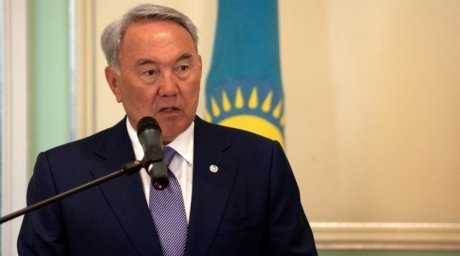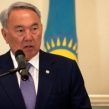
Kazakhstan Prepares to Sign Eurasian Union Treaty Despite Lingering Problems
Publication: Eurasia Daily Monitor Volume: 11 Issue: 87
By:

On April 28, Kazakhstani President Nursultan Nazarbayev paid a working visit to Russia’s capital, where he delivered a lecture at the Moscow State University, twenty years after his first similar speech there in 1994. Rather expectedly, the president’s speech was dedicated to the issue of post-Soviet integration, as Kazakhstan, Russia and Belarus are preparing to sign on May 29 in Astana the founding treaty of the Eurasian Economic Union (EEU). Since the mid-1990s, Kazakhstan has been a staunch supporter of various integration initiatives in the Commonwealth of Independent States (CIS). In 2000–2001, it played an instrumental role in the creation of the Eurasian Economic Community (EurAsEC), which would later serve as a springboard for a trilateral Customs Union with Russia and Belarus (Forbes.kz, April 28).
Nazarbayev once again defended the idea of Eurasian integration, listing some of its key benefits, such as access to a market of over 170 million consumers, wider opportunities for cross-border trade and investments, as well as the harmonization of quality norms and standards. “When speaking of the EEU, some people say that it will be a rebirth of the USSR. Such opinions are very far from the reality and simply groundless,” the president said, adding that similar views are largely based on growing fears in some corners of the world about future competition with the EEU in the international arena (akorda.kz, April 28).
The following day, Nazarbayev and Russian President Vladimir Putin flew to Minsk where they met with their Belarusian counterpart, Alyaksandr Lukashenka, to discuss a number of pending issues before the signing of the EEU treaty. While both Astana and Minsk have reaffirmed their strategic interest in pursuing further economic rapprochement with Moscow, none of them is actually fully satisfied with the current pace of integration, with the Kremlin being increasingly viewed in the two capitals as an arrogant and manipulative player (Ria.ru, April 29, Newskaz.ru, April 29).
For Kazakhstan, the third-largest economy in the CIS (behind Russia and Ukraine) and the largest one in Central Asia, the Customs Union has been a cause of much frustration since its inception in 2010. Although Kazakhstan’s trade turnover with Russia and Belarus grew by 29 percent in 2010–2013, from $18.8 billion to $24.3 billion, imports from these two countries increased by a whopping 43.7 percent ($12.8 billion in 2010 and $18.4 billion last year). At the same time, exports dropped by 3.3 percent from $6.1 billion to $5.9 billion. While there are only a few weeks left before the three states’ leaders will sign the 600-plus-page accord establishing the EEU, several key issues remain a source of headaches for the Kazakhstani side (zakon.kz, April 12).
First, there is still no agreement on the elimination of multiple tariff and non-tariff barriers that prevent the free movement of Kazakhstani goods into the Russian and Belarusian markets. These obstacles apply to products as diverse as construction materials, alcoholic beverages, tobacco and medicine as well as, most importantly, oil and gas. Despite Astana’s long-standing efforts to obtain concessions from Moscow on the energy front, the Minsk summit has not brought about any change in the Kremlin’s stance. Thus, Kazakhstan will still have to offset in one way or another Russia’s budget losses stemming from the duty-free imports of refined oil from Russian territory. Earlier in March, Russia’s Deputy Finance Minister Sergey Shatalov told Reuters that, if Moscow were to scrap all the existing restrictions related to oil and gas trade within the Customs Union, it would lose annually over $40 billion. It is, however, planned that a common oil and gas market will be established by 2025, which gives Russia a ten-year grace period (Mk.ru, April 29; Vedomosti.ru, March 18).
Second, the Kazakhstani leadership has repeatedly criticized Moscow’s plans to move forward with political integration, rather than focusing in the first place on economic and trade matters. In early April, some Kazakhstani media speculated about an eventual introduction of a common currency that would replace the local tenge. At a time when the EEU is being perceived by a growing number of Kazakhstanis as a threat to the country’s independence, such rumors are in no way favorable to better ties with Russia. On April 8, Kazakhstan’s Deputy Prime Minister Bakytzhan Sagintayev publicly refuted the existence of any formal plans to create a single currency for the forthcoming EEU. In a similar vein, the reasonableness of Moscow’s proposal to expand the EEU to Armenia, Kyrgyzstan and Tajikistan has been regularly cast in doubt by Astana. In spite of Kazakhstan’s and Belarus’s recurrent objections, the Kremlin looks determined to accept into the EEU first Yerevan and then Bishkek, before starting accession talks with Dushanbe (rus.azattyk.org, April 30; Today.kz, April 8).
Third, Kazakhstan’s membership in the Customs Union and the EEU may complicate its accession to the World Trade Organization (WTO), which President Nazarbayev recently said should be finalized by 2015. Earlier in January, the head of the WTO, Robert Azevedo, acknowledged some serious difficulties regarding the harmonization of Kazakhstan’s obligations vis-à-vis its partners in Moscow and Minsk, on the one hand, and the WTO community, on the other. This is particularly troubling after the International Monetary Fund (IMF) downgraded its forecast for Kazakhstan’s GDP growth for 2014 from 5.75 percent to 4.75 percent, well below the government’s expectations. As to Russia, its economy is on the verge of a recession, with the IMF having already revised its 2014 forecast from 1.3 percent growth to a meager 0.2 percent (Kapital.kz, May 4; Rbc.ru, April 30; see EDM, January 24).
As Kazakhstan looks to attract more Western investments and technologies, its closer ties with Russia—which is now being threatened with full-scale economic sanctions in retaliation for its interference in Ukraine—may turn out to be more of a liability than a long-term asset for Astana.




